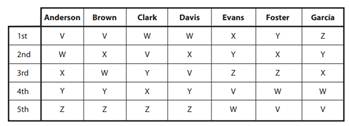Return to the discussion of instant runoff voting (IRV) in Exercise S6.
(a) Consider the following IRV ballots of five voters:

Which—if any—of the five voters have an incentive to vote strategically? If so, who and why? If not, explain why not.
(b) Consider the following table, which gives the IRV ballots of a small town of seven citizens voting on five policy proposals put forward by the mayor:

Assuming that all candidates (or policies) that tie for the fewest votes are eliminated at the same time, under what conditions is an eventual majority winner guaranteed? Put another way, under what conditions might there not be an unambiguous majority winner? (Hint: How important is it for Evans, Foster, and García to fill out their ballots completely?) How will these conditions change if Harris moves into town and votes?

